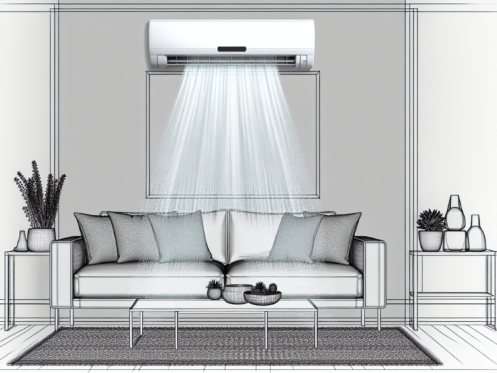When the summer heat is on the rise, the last thing you want is an air conditioner that’s not blowing cold air. A well-functioning air conditioner is crucial for comfort and health, especially during hot weather. In this article, we’ll explore some common issues that can affect your air conditioner’s cooling efficiency and provide you with straightforward solutions to get your system back to optimal performance. By the end, you’ll know how to tackle AC troubles and enjoy a cooler home.
Quick Checks: Simple Steps to Cooler Air
- Start by checking your thermostat settings. Make sure it’s set to ‘cool’ and that the temperature is lower than the current room temperature.
- Ensure the power supply to your AC is steady. Check for any tripped circuit breakers or blown fuses.
- Take a look at the vents around your home. They should be open and unblocked to allow for proper air flow. Furniture, curtains, or toys can sometimes obstruct vents without you realizing it.
These initial steps are easy to do and can often solve the problem without needing to dive deeper into your air conditioner system. However, if your air conditioner still isn’t cooling after these checks, it might be time to look at other components like filters, refrigerant levels, and the external unit.
Filter Maintenance: Ensuring Airflow and Quality
A clean filter is not just about keeping dust and allergens at bay; it’s a critical component for your air conditioner’s performance. A clogged filter restricts airflow, forcing your air conditioner to work harder and reducing its efficiency. Here’s how to keep your filter in top condition:
- Check your filter monthly: Check your AC filter every month, especially during high-use seasons. If the filter looks dirty, it’s time for a change.
- Replace as needed: Typically, you should replace your AC filter every 90 days, but homes with pets or high dust levels may need more frequent changes. Use your manufacturer’s guidelines for the best results.
- Choose the right filter: Make sure to use the correct size and type of filter for your air conditioner. Higher quality filters can provide better airflow and filtration.
For more detailed information on filter care, check out this helpful guide on maintaining your air conditioner.
Refrigerant Levels: The Coolant Connection
The refrigerant in your air conditioner is what absorbs the heat from your home and releases it outside. If your air conditioner isn’t blowing cold air, it could be a sign of low refrigerant levels. Here’s what you should know:
- Signs of low refrigerant: Warm air coming from vents, hissing sounds from the AC, ice on the refrigerant lines, or your air conditioner struggling to cool the home on hot days.
- Handling refrigerant issues: Dealing with refrigerant can be dangerous and needs careful handling. It’s essential to call in professionals who have the right tools and expertise to safely fix the problem.
Remember, adding refrigerant is not a DIY job. If you suspect your air conditioner has a refrigerant issue, reach out to a trusted service provider like Quality Cooling for expert assistance.
External Unit Efficiency: Keeping the Condenser Clear
When your air conditioner is not cooling as it should, the problem might be outside rather than inside. Your air conditioner’s external unit, which houses the condenser, is very important in dissipating heat to deliver cool air inside your home. However, several external factors can affect its efficiency:
- Debris like leaves, dirt, and grass clippings can block the condenser coils.
- Plants or shrubs growing too close can restrict airflow.
- Furniture or other objects placed too near the unit can impede function.
Keeping the area around your condenser clear is crucial. While regular homeowner upkeep is important, professional cleaning ensures that your system operates without any blockages. A clean condenser means your air conditioner can work more efficiently, keeping you cooler and possibly lowering your energy bills.
Thermostat and Control: Ensuring Accurate Temperature Regulation
Another common culprit for an air conditioner not blowing cold air is a problematic thermostat. This small device has a big job: controlling your home’s temperature. If it’s not working correctly, your air conditioner won’t know when to kick on or off. Here are some troubleshooting tips:
- Check for dead batteries if your thermostat is not hardwired.
- Ensure the thermostat sensor isn’t blocked by furniture or curtains.
- Clean the thermostat to remove any dust that may interfere with its operation.
If these steps don’t resolve the issue, it’s time to get a professional involved. They can diagnose and fix any complex problems, such as electrical issues or a broken thermostat, ensuring your air conditioner cools your home effectively.
The Professional Touch: Recognizing When Expertise is Needed
While many air conditioning issues can be resolved with simple checks and maintenance, there are times when calling in a professional is not only wise, but necessary. Here are some situations where expert help is crucial:
- Electrical problems: If you notice any burning smells or hear unusual noises coming from your air conditioner, it could indicate an electrical issue that needs immediate attention.
- Persistent issues: If you’ve tried troubleshooting and the problem persists, this could be a sign of a deeper issue that a professional should evaluate.
- Refrigerant leaks: Handling refrigerant needs careful handling due to its hazardous nature. If you suspect a leak, it’s time to call an expert.
- System upgrades: Installing a new thermostat or upgrading parts of your air conditioner system should be done by a technician to ensure everything is compatible and installed correctly.
Regular maintenance by a professional can prevent many of these issues and extend the life of your air conditioner. According to a study on HVAC maintenance, professional servicing can improve efficiency and save you money in the long run. When in doubt, reach out to the experts at Quality Cooling for reliable service.
Preventative Practices: Keeping Your AC in Top Shape
To avoid the discomfort of a broken AC, here are some preventative tips to keep your unit running smoothly:
- Schedule annual maintenance checks with a certified technician to catch potential issues early.
- Listen for any unusual sounds or look for signs of inefficiency, and address them promptly.
By following these steps, you can help ensure your air conditioner system remains reliable when you need it most. For complete maintenance services, visit Quality Cooling’s service page to learn how we can assist in keeping your air conditioner in top condition.


